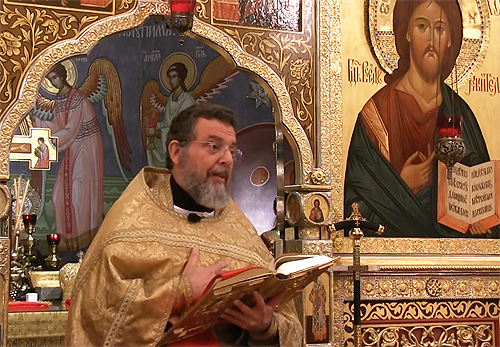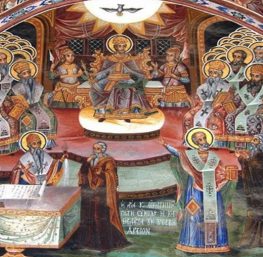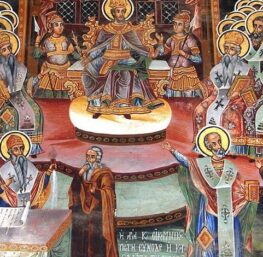 by Fr. Patrick Viscuso –
by Fr. Patrick Viscuso –
When imparting God’s sanctification and doing good, I can also say that there will be obstacles, for, as a 14th century Byzantine hieromonk once wrote, “Where is it necessary not without blood to struggle on behalf of the Truth?” That blood is the joy of the priesthood in its total dedication – mind, heart, soul, and body – to a loving a God, for whom our efforts are persistent and determined.
This struggle, on behalf of Truth, is to sustain the flock of the Church – an apostolic charge of Christ. As a minority, in a sea of disbelief and secularism, as ἁλιεῖς ἀνθρώπων, “fishers of men,” we are continually challenged to work for the spiritual perfection and the salvation of the faithful. The upholding of canonical standards that reflect the strength of our faith and our community will be tested, over whom the “gates of hell” will not prevail.
In the poetic words of a late Byzantine hieromonk, the holy canons – the canonical standards of the Church – are the “precious stones” that are “varied” and “differentiated” used in the building of a house constructed on the foundation of Jesus Christ. They are a divine-human reality parallel to the two natures of the Savior and are an expression of the Church’s Theandric economy. They express truth in the circumstances of history to address specific situations and circumstances, categories of behavior, specific persons, and institutional structures. In a word, our canonical standards are incarnational; they are the application of Truth to the specific circumstances of history and an expression of our Church’s pastoral life.
The parish priest is the practitioner of this canon law par excellence when he celebrates the Mysteries and administers them to the people of God; preaches and teaches; and acts as a shepherd in counseling, supporting, and manifesting this foundational love of Jesus Christ. In each case, he is applying the dogma of the Church to the practical lives of Christians.
As a practitioner – as the representative of Holy Tradition or Παράδοσις – he has a sacred obligation to obtain a sufficient knowledge of that Tradition. He must become a historical theologian – one who knows the history of the Church’s pastoral life – and one who can recognize the application of the Church’s teachings to the present – preserving – while at the same time dynamically creating solutions for the present.
Again, returning to some simple advice, based on experience in the priesthood, when walking among your flock and acting as a shepherd in serving and ministering to the people of God, please keep in mind, that when you are most tempted not to do something because you are too tired; not to stay and help; not to take the turn to celebrate; to allow yourself the indulgence of talking instead of praying in the altar; and not to take the time to reach out to that person that needs you, but to postpone and put off to another time – more often than not – this will be a sign that the one who opposes all good is active.
Satan is the cause of great suffering and confusion – and is described at various times in canonical texts, as being a “wolf” and “imposter;” and as “counterfeit,” “deceptive,” as a “withering into non-existence” and possessed of “madness.” His attempts at temptation will be a sign for you to know that at that moment, the opportunity to do the greatest good is present.
Part of your persistence and determination should be to never minimize or ignore the activity of Satan in this world, but to be aware and on guard, lest, in the words of one Byzantine commentator on the canons, “the evil one might not appear to derive an advantage, blazingly pilfering the eternal from the one performing priestly functions.”
Satan must be opposed in your sermons, in the Mysteries that you celebrate, and especially in the confessions that you will hear, through which you may be able to help people turn away from sin and be healed.
—————————————————
Excerpts from: The Rev. Dr. Patrick Viscuso Commencement Address (Minor organizational edits and bolding of key phrases done by blog editors done to enhance readability.)



